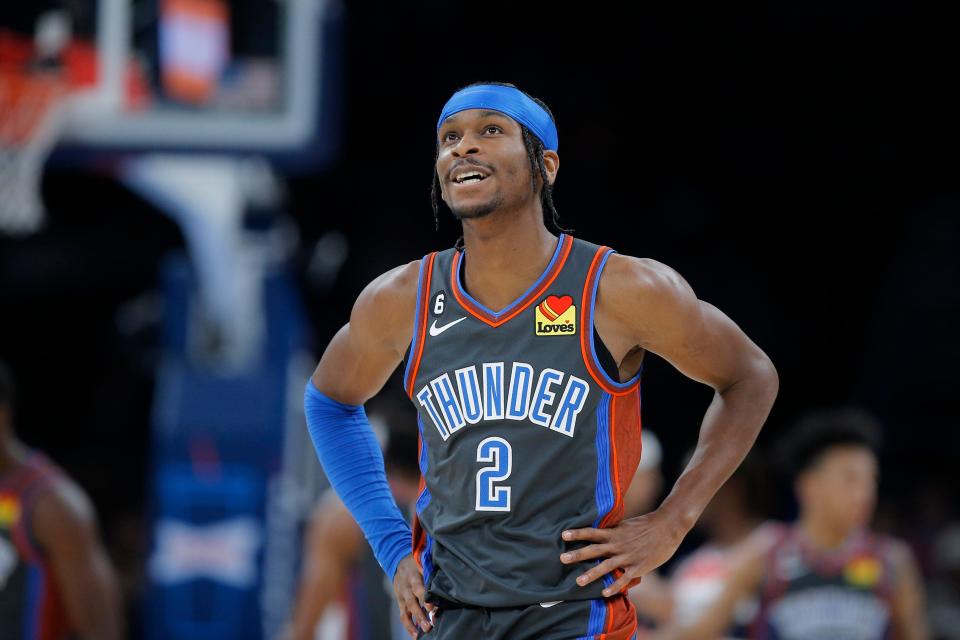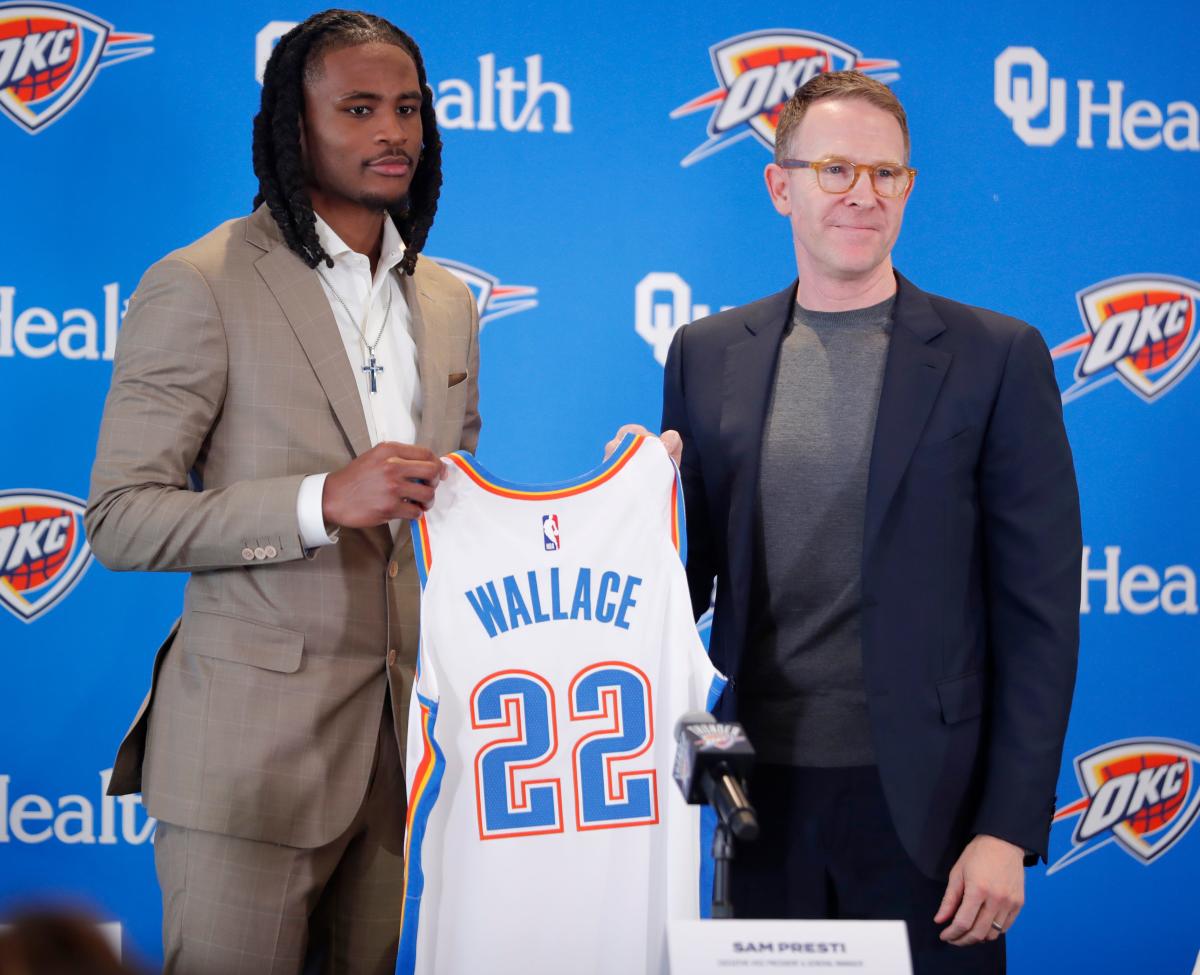LAS VEGAS — With all of the NBA assembled here in the desert, a city where only money flows, it’s an apt time and setting to analyze how Sam Presti and the Thunder have maximized every cent of every dollar they’ve spent this summer.
The Thunder entered the offseason with north of $30 million in salary cap space, and unlike in 2021-22 when the Thunder’s end-of-season payroll was roughly $22 million below the salary floor — a shortfall that was distributed amongst Thunder players — the new collective bargaining agreement has harsh penalties for teams that fail to meet the salary floor by the start of the season, thus incentivizing teams to use their cap space in the offseason.
However, as the Thunder has creatively shown, there’s more than one way to spend.
Rather than signing free agents either on one-year deals to reach the salary floor, or on potentially burdensome multi-year deals, the Thunder approached its space with only the future in mind. A future in which the primes of Shai Gilgeous-Alexander, Josh Giddey, Jalen Williams, Chet Holmgren and who knows who else could all overlap.
More: How OKC Thunder’s David Akinyooye embraces new experience as NBA Summer League coach

Gilgeous-Alexander is already on his rookie max extension (which will pay him upwards of $40 million annually through 2026-27), and in the Thunder’s best-case scenario, the likes of Giddey, Williams and Holmgren could also be on their way to rookie max extensions. It’s obviously early, as Holmgren has yet to play in an NBA game, but it’s a scenario in which the Thunder is preparing for.
Keeping homegrown talent even under those contracts is possible under the new CBA, but it would also come with a gargantuan price tag for a small-market ownership group, led by Clay Bennett, that doesn’t have Steve Ballmer-sized pockets.
While it remains to be seen how Thunder ownership will respond if and when that juncture arrives, as it similarly did in 2012, Presti and Co. are operating in a way to not let present-day spending on a promising yet inexperienced team sacrifice the financial flexibility, and banked savings, the front office will need when it’s time to contend.
That’s why the Thunder didn’t make a Dillon Brooks-esque signing or similar splash in free agency. OKC instead operated in the margins, taking on unwanted expiring contracts in exchange for picks as it did in acquiring Patty Mills ($6.8 million), Victor Oladipo ($9.5 million) and Rudy Gay ($6.5 million).
The Thunder received three second-round picks for taking on Mills’ contract from Houston, and then, remarkably, OKC added another second-round pick in flipping Mills to Atlanta in a separate deal. The Thunder also received former Rockets Usman Garuba and TyTy Washington Jr. in the deal with Atlanta.
More: Meet the OKC Thunder’s ‘junkyard dog’ on NBA Summer League team — Caleb McConnell
Garuba and Washington have underwhelmed as recent first-round picks, but the Thunder could flip one or both of them, or try to develop them within a more structured system. Or outright waive them if nothing materializes, although there’s plenty of time before that’s necessary.
Teams can carry up to 21 players in the offseason, and right now the Thunder is at 19 players on standard contracts, not counting the reported free agent additions of former EuroLeague MVP Vasilije Micic, who will sign using the room level exception, and Jack White, which would bring the number to 21.
And when cutting a player/players is inevitable, whether a veteran like Oladipo or a prospect like Garuba, the Thunder is operating from a position of strength, being able to pick its best 17 guys when the season starts. You’d rather make hard decisions on players 18 to 21 than players one to four.
The Thunder’s flurry of head-spinning, and sometimes headache-inducing, moves have made the Thunder’s offseason easy to poke at: Does the Thunder know it can’t carry 39 players? What about the roster crunch? How is Aaron Wiggins going to get minutes? What about Poku? Is OKC hoarding second-round picks for fun?
But the Thunder, in case you haven’t noticed, doesn’t care much about optics.
Heck, by the time the Thunder’s trade for Mills was made official Saturday, the trade to send him away had already been reported.
In addition to using its cap space to sign Micic and White, and absorbing the contracts of Oladipo and Gay, the Thunder’s biggest maneuver came on draft night.
The Thunder used about half of its salary cap space to take on Davis Bertans’ contract from the Mavericks. Bertans, a sharpshooter who will have a chance to stick in OKC, is owed $17 million this season with only $5 million guaranteed in 2024-25.
For cleaning up Dallas’ books, the Thunder swapped its No. 12 pick for the Mavericks’ 10th pick. In doing so, OKC made sure it got its guy in guard Cason Wallace, who dazzled in his summer league debut.
And while taking on $17 million of perceived bad money might seem like a steep price, it was $17 million the Thunder had to spend anyway this season, all while keeping its books clean, and coffers filled, in the years beyond.
They might not look neat or make sense on the surface, but every move the Thunder has made this offseason has been about banking every draft asset and dollar now, bracing for when it’s time to pay up and go all-in.
Thunder offseason timeline
June 9
– Thunder trades: Least valuable of its possible four 2024 first-round picks, 37th pick in 2023 draft (Hunter Tyson), 2024 second-round pick
– Nuggets trade: 2029 first-round pick (protections not reported)
June 22
– Thunder trades: No. 12 pick (Dereck Lively II)
– Mavericks trade: No. 10 pick (Cason Wallace), Davis Bertans
– Thunder drafts Keyontae Johnson with the 50th pick
June 30
– Thunder declines $1.9 million team option for Lindy Waters III, making Waters an unrestricted free agent
July 6
– Thunder trades: Cash considerations
– Heat trades: Victor Oladipo, 2029 second-round pick, 2030 second-round pick
July 8
As part of a five-team deal …
– Thunder trades: Cash considerations to Hawks
– Rockets trade: Patty Mills, 2024 second-round pick, 2029 second-round pick, 2030 second-round pick to Thunder
July 8
According to ESPN’s Adrian Wojnarowski …
– Thunder trades: Patty Mills
– Hawks trade: TyTy Washington Jr., Usman Garuba, Rudy Gay, future second-round pick
Thunder 2023-24 roster/salary sheet (as of July 9)
• Shai Gilgeous-Alexander: $33.4 million
• Davis Bertans: $17 million
• Lu Dort: $15.3 million
• Chet Holmgren: $10.4 million
• Victor Oladipo: $9.5 million
• Vasilije Micic: $7.7 million*
• Josh Giddey: $6.6 million
• Rudy Gay: $6.5 million
• Kenrich Williams: $6.2 million
• Cason Wallace: $5.3 million
• Aleksej Pokusevski: $5 million
• Ousmane Dieng: $4.8 million
• Jalen Williams: $4.6 million
• Tre Mann: $3.2 million
• Usman Garuba: $2.6 million
• TyTy Washington Jr.: $2.3 million
• Jaylin Williams: $2 million
• Isaiah Joe: $2 million
• Jeremiah Robinson-Earl: $1.9 million
• Aaron Wiggins: $1.8 million
• Jack White: $1.8 million*
• Keyontae Johnson: Two-way contract
* Salary estimates. Micic and White have not officially been signed.
This article originally appeared on Oklahoman: OKC Thunder’s use of cap space is all about sustaining its future

